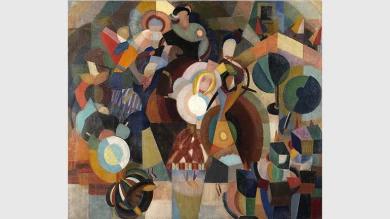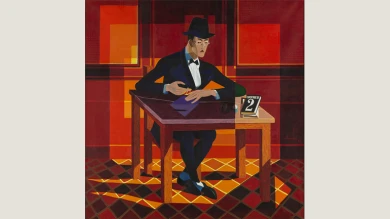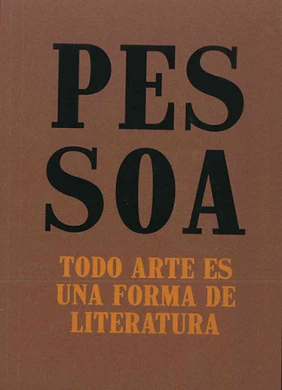-
Wednesday, 18 April – 7pm
Session 1
Second session: Monday, 23 April – 7pm
Manoel de Oliveira
Douro, Faina Fluvial (Labour on the Douro River), 1931
Portugal, 35 mm, silent, b/w, 26'Paulo Rocha
Máscara de Aço contra Abismo Azul (Steel Mask Versus Blue Abyss), 1988
Portugal, 35 mm, colour, 64'First session presented by António Preto, professor of Film Studies and Audiovisuals at the Escola Superior Artística and Universidade Lusófona (Porto) and head of the Manoel de Oliveira House-Museum (Serralves Foundation, Porto).
This session centres on the avant-garde art which was contemporary to Pessoa. In 1931, Manoel de Oliveira screened his first film, Douro, Faina Fluvial, a cinematic portrait of the Douro River, the lifeblood of Porto, his home town. Oliveira constructs a visual symphony along the lines of Walter Ruttmanny’s Symphony for a Great City and Dziga Vertov’s The Man with a Movie Camera in a film, brimming with evocative compositions and cadenced edits created through repetition — akin to the montages of the time — widely recognised as a masterpiece and a precursor of experimental cinema in Portugal. The film paints a unique portrait of Porto in 1930, a city caught between tradition and modernity, between the manual and the mechanical. In Máscara de Aço contra Abismo, meanwhile, Paulo Rocha, another point of reference in Portuguese cinema, takes a highly personal approach to the career of the foremost artist in the Portuguese avant-garde scene, Amadeo de Souza-Cardoso, who died in 1918 at the age of 30 and whose work calls into question the dominant narratives in avant-garde movements of the past.
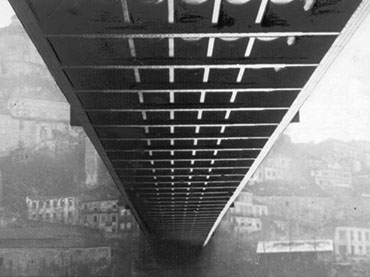
-
Thursday, 19 April – 7pm
Session 2
Second session: Thursday, 26 April – 7pm
Manoel de Oliveira
Non ou a Vã Glória de Mandar (No, or the Vain Glory of Command), 1990
Portugal, 35 mm, colour, 111'The film Non ou a Vã Glória de Mandar explores the misfortunes of Portugal’s history and the myth of King Sebastian of Portugal. His death aged 24 in a battle in North Africa engendered the country’s loss of independence as it fell into the hands of the Spanish kings, monarchs of Portugal by direct succession until 1640. From that point on the belief was born that the return of Sebastian one foggy morning would mark the end of any crisis the country faced. This myth, and the loss of identity of a nation mired in underdevelopment, foreign influence and melancholy of the past, also runs through the work of Pessoa, above all in his poetry collection Mensagem (Message), which to some degree is expanded upon by Oliveira in this film.
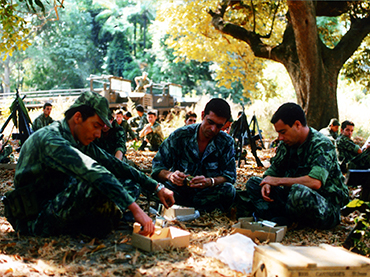
-
Friday, 20 April – 7pm
Session 3
Second session: Friday, 27 April – 7pm
Júlio Bressane
O Batuque dos Astros (Drumming Beat of the Stars), 2012
Brazil, digital archive, colour, 74'First session presented by the director, Júlio Bressane.
The work of Fernando Pessoa was greeted favourably in Brazil once it started to gain traction. Notable is its influence on the film O Batuque dos Astros, in which a master of Brazilian cinema, Júlio Bressane, sets forth a parallel journey around the city of Lisbon and the life of Pessoa, combining his writings and the places he lived. Consequently, it expounds a seemingly abstract documentary cartography with an Impressionist structure to its narration, using music to dramatic effect and the asynchronous concept of sound to create atmosphere. An icon of non-conformist cinema in the Brazilian underground, Bressane brandishes a defence of life as a method of film-making in this film, paying homage to Fernando Pessoa and alluding to the multi-faceted relationship between cinema, writing and the city, arduously reducible to one sole form.
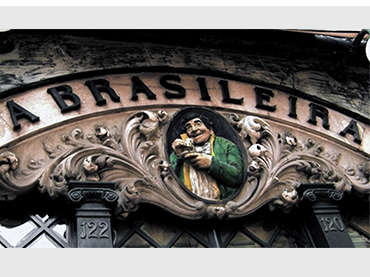
-
Saturday, 21 April – 7pm
Session 4
Second session: Sunday, 29 April – 5pm
João Botelho
Conversa Acabada (The Other One), 1981
Portugal, 35mm, colour, 105'João César Monteiro
Conserva Acabada (The End of the Conversation), 1990
Portugal, digital archive, colour, 12’First session presented by Portuguese director João Botelho
Conversa Acabada is a feature-length film by João Botelho which focuses on the correspondence Pessoa kept with his friend and poet Mário de Sá-Carneiro, with whom he founded the first magazine of Portuguese modernity, Orpheu (1915). This film ushers in a decade, the 1980s, in which Pessoa’s work spread far and wide, both in Portugal and overseas, with the publication of a number of unpublished texts, most notably The Book of Disquiet, which in turn prompted Botelho to make another film, Filme do Desassossego, in 2010. The same session also features the screening of Conserva Acabada, a short film by João César Monteiro on the difficulties a director faces to secure funding and make a film on Pessoa. The work constitutes the first paradoxical and irreverent critique of the tourist industry’s appropriation of Pessoa and the creation of a “Pessoa brand” with the statue of the writer in the famous A Brasileira café in Lisbon.
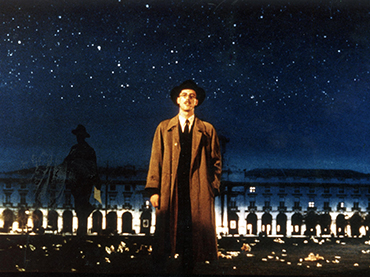
Pessoa and Film
![Julio Bresane. O Batuque dos Astros [Algarabía de los astros]. Película, 2012](https://recursos.museoreinasofia.es/styles/large_landscape/public/Actividades/pessoa-gr.jpg.webp)
Held on 18, 19, 20, 21, 22, 23, 24, 25, 26, 27, 28, 29 Apr 2018
Fernando Pessoa (1888–1935) and the invention of the modern subject in a body of writing intersected by melancholy and the conception of multiple fictitious identities form the backbone of this series, a survey on the author of The Book of Disquiet from the perspective of film. The programme touches upon themes such as the relationship between writing and life, performance and narrative, and non-literary forms of text, featuring films by four Portuguese directors, Manoel de Oliveira, João Botelho, Paulo Rocha, and João César Monteiro, and one Brazilian, Júlio Bressane, whose work constitutes, historically speaking, a playful, popular and counter-cultural opposition to Cinema Novo.
Pessoa’s interest in film led him to write six scripts, ranging from the absurd, a critique of one sole identity and a reconsideration of genres (Note for a Silly Thriller, Note for a Thriller and The Multiple Nobleman, for instance), and to establish his own production company, Ecce Film, for which he designed a logo and searched for premises. Neither the company nor the films ever came to fruition, however.
Furthermore, the writing of Fernando Pessoa assembles some of the key themes in contemporary auteur cinema, mapping a route through the major reference points in modern Portuguese film. In essence, the crisis of existence, the city and urban experience as a transition towards dissolution, the conception of identity as a multiple and performative act, the progressive decadence of a country after its past nationalist glories, and the assimilation of cultural critique in tourism and cultural brands, for instance with Pessoa in modern-day Lisbon, are themes which enable the confluence between the writer and the film-makers to be established.
This series engages in dialogue with the exhibition Pessoa. All Art Is a Form of Literature (Museo Reina Sofía, until 7 May 2018), and, by the same token, looks to explore the relationships between writing and life, in this case through film, and to delve into non-literary forms and spaces in texts and writing.
With the support of
Organised by
Museo Reina Sofía
In collaboration with
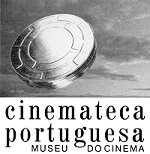
Más actividades
![Tracey Rose, The Black Sun Black Star and Moon [La luna estrella negro y negro sol], 2014.](https://recursos.museoreinasofia.es/styles/small_landscape/public/Obra/AD07091_2.jpg.webp)
On Black Study: Towards a Black Poethics of Contamination
Monday 27, Tuesday 28 and Wednesday 29 of April, 2026 – 16:00 h
The seminar On Black Study: Towards a Black Poethics of Contamination proposes Black Study as a critical and methodological practice that has emerged in and against racial capitalism, colonial modernity and institutional capture. Framed through what the invited researcher and practitioner Ishy Pryce-Parchment terms a Black poethics of contamination, the seminar considers what it might mean to think Blackness (and therefore Black Study) as contagious, diffuse and spreadable matter. To do so, it enacts a constellation of diasporic methodologies and black aesthetic practices that harbor “contamination” -ideas that travel through texts, geographies, bodies and histories- as a method and as a condition.
If Blackness enters Western modernity from the position of the Middle Passage and its afterlives, it also names a condition from which alternative modes of being, knowing and relating are continually forged. From within this errant boundarylessness, Black creative-intellectual practice unfolds as what might be called a history of touches: transmissions, residues and socialities that unsettle the fantasy of pure or self-contained knowledge.
Situated within Black radical aesthetics, Black feminist theory and diasporic poetics, the seminar traces a genealogy of Black Study not as an object of analysis but as methodological propositions that continue to shape contemporary aesthetic and political life. Against mastery as the horizon of study, the group shifts attention from what we know to how we know. It foregrounds creative Black methodological practices—fahima ife’s anindex (via Fred Moten), Katherine McKittrick’s expansive use of the footnote, citation as relational and loving labour, the aesthetics of Black miscellanea, and Christina Sharpe’s practices of annotation—as procedures that disorganise dominant regimes of knowledge. In this sense, Black Study is approached not as a discrete academic field but as a feel for knowing and knowledge: a constellation of insurgent practices—reading, gathering, listening, annotating, refusing, world-making—that operate both within and beyond the university.
The study sessions propose to experiment with form in order to embrace how ‘black people have always used interdisciplinary methodologies to explain, explore, and story the world.’ Through engagements with thinkers and practitioners such as Katherine McKittrick, C.L.R. James, Sylvia Wynter, Christina Sharpe, Fred Moten, Tina Campt, Hilton Als, John Akomfrah, fahima ife and Dionne Brand, we ask: What might it mean to study together, incompletely and without recourse to individuation? How might aesthetic practice function as a poethical intervention in the ongoing work of what Sylvia Wynter calls the practice of doing humanness?

Intergenerationality
Thursday, 9 April 2026 – 5:30pm
This series is organised by equipoMotor, a group of teenagers, young people and older people who have participated in the Museo Reina Sofía’s previous community education projects, and is structured around four themed blocks that pivot on the monstrous.
The third session gazes at film as a place from which to dismantle the idea of one sole history and one sole time. From a decolonial and queer perspective, it explores films which break the straight line of past-present-future, which mix memories, slow progress and leave space for rhythms which customarily make no room for official accounts. Here the images open cracks through which bodies, voices and affects appear, disrupting archive and questioning who narrates, and from where and for whom. The proposal is at once simple and ambitious: use film to imagine other modes of remembering, belonging and projecting futures we have not yet been able to live.

Remedios Zafra
Thursday March 19, 2026 - 19:00 h
The José Luis Brea Chair, dedicated to reflecting on the image and the epistemology of visuality in contemporary culture, opens its program with an inaugural lecture by essayist and thinker Remedios Zafra.
“That the contemporary antifeminist upsurge is constructed as an anti-intellectual drive is no coincidence; the two feed into one another. To advance a reactionary discourse that defends inequality, it is necessary to challenge gender studies and gender-equality policies, but also to devalue the very foundations of knowledge in which these have been most intensely developed over recent decades—while also undermining their institutional support: universities, art and research centers, and academic culture.
Feminism has been deeply linked to the affirmation of the most committed humanist thought. Periods of enlightenment and moments of transition toward more just social forms—sustained by education—have been when feminist demands have emerged most strongly. Awareness and achievements in equality increase when education plays a leading social role; thus, devaluing intellectual work also contributes to harming feminism, and vice versa, insofar as the bond between knowledge and feminism is not only conceptual and historical, but also intimate and political.
Today, antifeminism is used globally as the symbolic adhesive of far-right movements, in parallel with the devaluation of forms of knowledge emerging from the university and from science—mistreated by hoaxes and disinformation on social networks and through the spectacularization of life mediated by screens. These are consequences bound up with the primacy of a scopic value that for some time has been denigrating thought and positioning what is most seen as what is most valuable within the normalized mediation of technology. This inertia coexists with techno-libertarian proclamations that reactivate a patriarchy that uses the resentment of many men as a seductive and cohesive force to preserve and inflame privileges in the new world as techno-scenario.
This lecture will address this epochal context, delving into the synchronicity of these upsurges through an additional parallel between forms of patriarchal domination and techno-labor domination. A parallel in which feminism and intellectual work are both being harmed, while also sending signals that in both lie emancipatory responses to today’s reactionary turns and the neutralization of critique. This consonance would also speak to how the perverse patriarchal basis that turns women into sustainers of their own subordination finds its equivalent in the encouraged self-exploitation of cultural workers; in the legitimation of affective capital and symbolic capital as sufficient forms of payment; in the blurring of boundaries between life and work and in domestic isolation; or in the pressure to please and comply as an extended patriarchal form—today linked to the feigned enthusiasm of precarious workers, but also to technological adulation. In response to possible resistance and intellectual action, patriarchy has associated feminists with a future foretold as unhappy for them, equating “thought and consciousness” with unhappiness—where these have in fact been (and continue to be) levers of autonomy and emancipation.”
— Remedios Zafra

ARCO2045. The Future, for Now
Saturday 7, March 2026 - 9:30pm
The future, its unstable and subjective nature, and its possible scenarios are the conceptual focus of ARCOmadrid 2026. A vision of the future linked to recent memory, a flash of insight into a double-edged sword. This year's edition, as in the previous two, will once again hold its closing party at the Reina Sofia Museum. This time, the star of the show is Carles Congost (Olot, Girona, 1970), one of the artists featured in the new presentation of the Collections recently inaugurated on the 4th floor of the Sabatini Building.
Carles Congost, with his ironic and timeless gaze, is responsible for setting the tone for this imperfect future, with a DJ session accompanied by some of his works in the Cloister on the first floor of the Sabatini Building of the Museo on the night of Saturday 7 March.

27th Contemporary Art Conservation Conference
Wednesday, 4, and Thursday, 5 March 2026
The 27th Contemporary Art Conservation Conference, organised by the Museo Reina Sofía’s Department of Conservation and Restoration, with the sponsorship of the Mapfre Foundation, is held on 4 and 5 March 2026. This international encounter sets out to share and debate experience and research, open new channels of study and reflect on conservation and the professional practice of restorers.
This edition will be held with in-person and online attendance formats, occurring simultaneously, via twenty-minute interventions followed by a five-minute Q&A.
